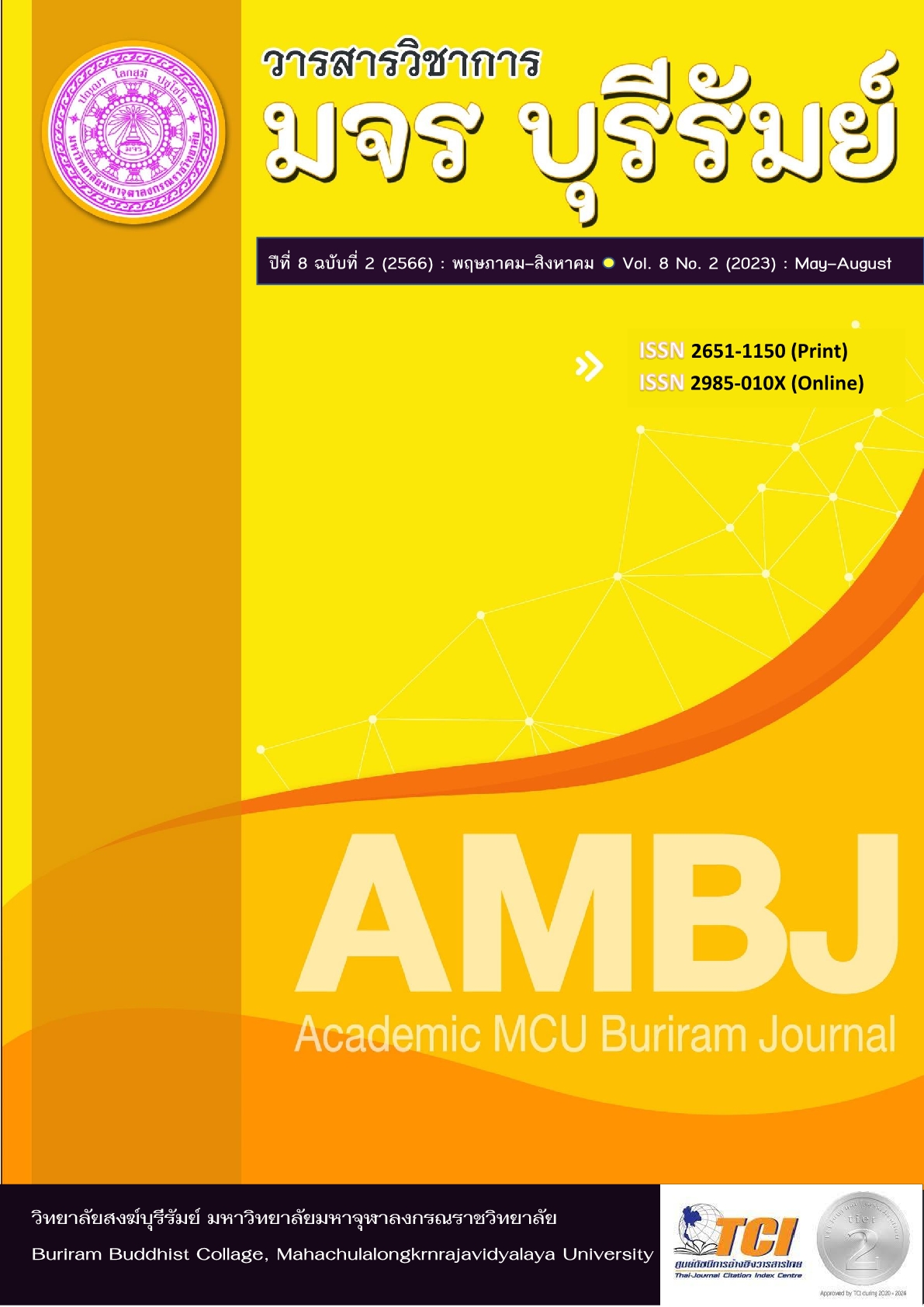An Analytical Study of the Practice Bhikhu Aparihaniyadhamma of Buddhist Monks in Buddhist Scriptures
Keywords:
Practice, Parihaniyadhamma, BuddhismAbstract
The purposes of this research were: 1) to study the practice of Bhikkhu Aparihaniyadhamma of Buddhist monks in Buddhist scriptures and 2) to analyze the application of Bhikkhu Aparihaniyadhamma principles in Thai society. This research is a qualitative research by studying from the Tripitaka other Buddhist scriptures, academic documents on Buddhism and other academic documents on the Bhikkhu Aparihaniyadhamma and related research by descriptive analysis method.
The research result found that:
1. The practice of Bhikkhu Aparihaniyadhamma of Buddhist monks in Buddhist scriptures is the Dhamma for prosperity only. It supports the cooperation in thinking and doing of Buddhist monks. Even for the meeting the monks have to start and finish the meeting altogether because they have to take joint responsibility for Buddhist affaires, giving right opinions and controlling the meeting to run according to the agenda. They must not regulate the rules that the Buddha did not. The principles of Buddhist practice are the Buddha’s teachings without additions and amendment because they were regulated through insight knowing and seeing about present, past and future according to the Buddha’s practices.
2. An analysis of the application of Bhikkhu Aparihaniyadhamma principles in Thai society as for obedience to the right matters according to the discipline, there are respect, humbleness and respect to senior monks, if some junior monks do not agree to the matters in the meeting, the senior monks can reasonably explain and give discussion. Precepts or moralities are used to inspect and control body and speech. There should be awareness of instigation from sense-organs and sense-objects. Meditation and wisdom are used to prevent the overpower by desires. Living in forestry dwelling causes quiet, fleshy air and strong health. In case of much noise, do not mind, ignore it and have mindfulness and wisdom to consider it clearly so that there will be physical and mental happiness in living the monkhood. All monks and novices are welcome to join and live peacefully and happily. All the monks and the novices, who were ordained righteously, have equal moralities and practice the same principles, are selfless, generous, not jealous of dwelling, not envious and have charities, live together happily.
References
กนก จันทร์ขจร. (2549). ธรรมเพื่อชีวิต. กรุงเทพมหานคร: หจก.จิรรัชการพิมพ์.
พระพรหมคุณาภรณ์ (ป.อ. ปยุตฺโต). (2550). พจนานุกรมพุทธศาสน์ ฉบับประมวลศัพท์. พิมพ์ครั้งที่ 19. กรุงเทพมหานคร: โรงพิมพ์มหาวิทยาลัยมหาจุฬาลงกรณราชวิทยาลัย.
พระครูโสภณปริยัติสุธี (ศรีบรรดร ถิรธมฺโม). (2552). รัฐศาสตร์ในพระไตรปิฎก. กรุงเทพมหานคร: โรงพิมพ์มหาจุฬาลงกรณราชวิทยาลัย.
พระธรรมปิฎก (ป.อ. ปยุตฺโต). (2538). ไอทีภายใต้วัฒนธรรมแห่งปัญญา. กรุงเทพมหานคร: โรงพิมพ์สหธรรมิก.
พระครูปริยัติวิสุทธิคุณ. (2562). การปกครองคณะสงฆ์ไทยในยุคปฏิรูปไทยแลนด์ 4.0. วารสารวิชาการ มจรบุรีรัมย์, 4(2), 87-103.
พระขจรศักดิ์ กิตฺติวุฑโฒ. (2562). การบริหารงานตามหลักอปริหานิยธรรมของเทศบาลนครตรัง จังหวัดตรัง. วารสารการบริหารและสังคมศาสตร์ปริทรรศน์, 2(2), 17-24.
พระมหาประกอบ กิตฺติญาโณ (อิ่มจิตร), จรัส ลีกา. (2564). การพัฒนาสังคมในทัศนะพุทธปรัชญาเถรวาท. วารสารบัณฑิตศึกษามหาจุฬาขอนแก่น, 8(2), 47.
มหาวิทยาลัยมหาจุฬาลงกรณราชวิทยาลัย. (2539). พระไตรปิฎกภาษาไทยฉบับมหาจุฬาลงกรณราชวิทยาลัย. กรุงเทพมหานคร: โรงพิมพ์มหาจุฬาลงกรณราชวิทยาลัย.
ส.รัตนรติ. (2522). หลักธรรมสำคัญสำหรับชาวพุทธ ภิกษุ สามเณร อุบาสก อุบาสิกา และประชาชน. กรุงเทพมหานคร: ธรรมสภา.
Downloads
Published
How to Cite
Issue
Section
License
Copyright (c) 2023 Academic MCU Buriram Journal

This work is licensed under a Creative Commons Attribution-NonCommercial-NoDerivatives 4.0 International License.
ทัศนะและความคิดเห็นที่ปรากฏในบทความวารสารฉบับนี้ถือเป็นความรับผิดชอบของผู้เขียนบทความนั้น ไม่ถือเป็นทัศนะและความรับผิดชอบของบรรณาธิการ





